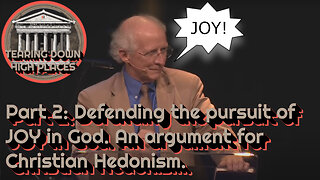Premium Only Content

EP 81 | Is John Piper's Christian Hedonism biblical? (Part 1)
Summary of Dr. Ardel Caneday’s Discussion on Christian Hedonism Guest: Dr. Ardel Caneday explores John Piper’s Christian Hedonism, its theological roots, and related doctrines. Christian Hedonism: Piper’s concept, from Desiring God (1986), states “God is most glorified in us when we are most satisfied in Him,” drawing from Jonathan Edwards, C.S. Lewis, and Philippians 1:20–23. It reinterprets the Westminster Catechism’s call to glorify and enjoy God forever. Theological Influences:
• Edwards: God’s glory shines through human joy in Him.
• Lewis: True joy lies in God, not weak worldly desires.
• Related Movements: Wesleyan Perfectionism, Keswick Theology, and Lordship Salvation emphasize deeper spiritual experiences or submission to Christ, contrasting with Free Grace’s faith-alone view.
Critiques:
• Selfishness: Critics argue focusing on personal joy may foster self-centeredness, undermining sacrificial love.
• Idolatry: Some claim it prioritizes pleasure over God, though Piper counters joy in God fuels love (2 Corinthians 8:2).
• Biblical Weakness: Critics like Bible League Trust say it lacks robust scriptural support, reducing faith to emotion.
• Pietism/Gnosticism: Caneday may critique its focus on internal joy as potentially neglecting practical obedience, risking a Gnostic-like devaluation of the material world.
Key Debates:
• Lordship Salvation vs. Free Grace: Piper aligns with Lordship Salvation (faith includes submission), opposing Free Grace’s “carnal Christian” concept.
• Justification/Sanctification: B.B. Warfield distinguishes them as separate acts of faith, while Caneday may question if Piper’s view blends them.
• Eudaimonism: A less controversial term than “hedonism,” which critics call clickbait for implying selfishness.
Context: Piper’s ideas, shaped at Grace Theological Seminary, engage evangelical debates like progressive dispensationalism, moving away from Keswick’s “higher life.” Caneday likely examines if Piper’s focus on joy neglects repentance or holiness, referencing figures like Al Mohler and Tom Schreiner.
-
 1:02:40
1:02:40
Tearing Down High Places
1 month agoEP 82 | Pursuing Joy in God Part 2: Defending John Piper's Christian Hedonism
191 -
 2:32:12
2:32:12
The Charlie Kirk Show
6 hours agoTPUSA Presents This is The Turning Point Tour LIVE with Michael Knowles
123K50 -
 LIVE
LIVE
Drew Hernandez
10 hours agoDISNEY CUCKS FOR KIMMEL & ADDRESSING THE CHARLIE KIRK MEMORIAL AFTERMATH
1,071 watching -
 1:02:28
1:02:28
Flyover Conservatives
10 hours agoThe Most Overlooked Way to Fight Abortion (It’s Not Protests) - Robert Netzly; Why Triple-Digit Silver is Coming - Dr. Kirk Elliott | FOC Show
35K3 -
 1:55:33
1:55:33
Glenn Greenwald
9 hours agoDeceitful Hysteria over Tucker's Speech on Kirk; IDF Funder Larry Ellison to Take Over CBS, Paramount, and now TikTok; U.S. Embraces Leading Al-Qaeda Terrorist | SYSTEM UPDATE #519
194K90 -
 34:40
34:40
Donald Trump Jr.
10 hours agoWe Will Make Charlie Proud | TRIGGERED Ep.276
210K90 -
 1:01:49
1:01:49
BonginoReport
9 hours agoErika Kirk Forgives Charlie’s Assassin - Nightly Scroll w/ Hayley Caronia (Ep.139)
115K98 -
 1:54:19
1:54:19
megimu32
6 hours agoOn The Subject: Rush Hour | Would It Be Cancelled Today?
43.3K6 -
 1:24:12
1:24:12
Katie Miller Pod
8 hours ago $2.93 earnedEpisode 7 - Jillian Michaels | The Katie Miller Podcast
82.1K5 -
 13:09:57
13:09:57
LFA TV
1 day agoLFA TV ALL DAY STREAM ! | MONDAY 9/22/25
243K49